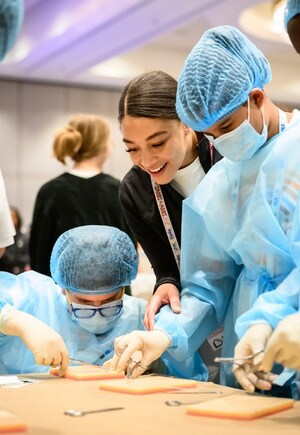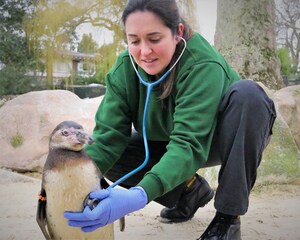B-Roll and Soundbites Capture Unique Learning Event
ORLANDO, Fla., May 25, 2023 /PRNewswire/ -- Veterinarians and veterinary nurses/technicians attending the 22nd NAVC Institute wrapped up a week of hands-on intensive learning in Orlando today. Attendees practiced and mastered one specific area of veterinary medicine such as: knee and hip surgery on dogs; diagnostic imaging to detect cancer or guide dental procedures on rabbits; and advanced emergency and critical care skills in simulated emergency situations. In this unique, immersive conference, hosted by the North American Veterinary Community (NAVC), veterinary professionals worked side-by-side with world renowned experts in their field, perfecting new skills they can immediately use to provide life-saving and enhancing medical care for their patients.
"The exciting thing about veterinary medicine is that we are seeing it parallel human medicine more and more. Advancements, new techniques, new medications, and new ways of treating diseases are coming just as fast to veterinary medicine as they are to human medicine," said Dana Varble, DVM, CAE and NAVC Chief Veterinary Officer. "At the NAVC Institute, veterinary participants get to focus on one area and really master certain skills. For example, in emergency and critical care, they're not only perfecting their recognition of shock, but also learning to anticipate how the animal's condition might change suddenly, and how they can intervene to improve the chances of survival."
B-roll of NAVC Institute workshops, lectures and interviews with veterinary experts are available here: NAVC Institute 2023 Broll and soundbites.
Key session overviews and quotes from session leaders and instructors:
Emergency and Critical Care. This course included simulation-based learning where veterinarians and veterinary nurses/technicians worked side-by-side as they do in clinics to learn how to identify life-threatening conditions and treat animals in emergency situations. They treated potential patients using a high-fidelity simulator that produces heart and lung sounds, pulses, and breaths connected to a multi-parameter monitor, allowing participants to immerse themselves in a life-like environment, putting their knowledge and skills to test. "Simulation teaching is a well-established modality in human medicine and a growing area of education in veterinary medicine," said instructor Armi Pigott, DVM, DACVECC. "Simulation can create a lot of the emotional and physical feeling of a real case, and help someone who's never seen this specific situation before. The rising heart rate of the 'patient,' and the stress of being in there and treating this really sick patient in a fairly low stakes environment is incredibly beneficial. They can come in, practice, get things right, get things wrong, and then, we can talk about how it went. After that, they can practice over and over until they get it right."
Exotics. Exotic pets are more popular than ever with nearly 9 million American households owning an exotic pet including rabbits, hamsters, reptiles, birds, chickens and more. "The exciting thing about exotics is that the same things we can do for humans, dogs, and cats, including advanced imaging, we can do for our exotic species," said course leader Jennifer Graham, DVM, DABVP (Avian/ECM), DACZM. "Pet owners want these pets to receive the same quality of care from CT scans to MRIs, endoscopy, ultrasound, even advanced surgeries. So even though they're quite small, we're able to still provide that same level of care." Participating veterinarians and veterinary nurses/technicians advanced their skills working with pet birds, backyard poultry, small mammals including rabbits and hedgehogs, and reptiles. Coursework spanned a wide range including diagnostic imaging, rabbit and rodent dentistry and reptile reproductive surgery. They also learned to stabilize and treat exotics in an emergency situation.
Orthopedic surgery. Veterinarians participating in these sessions focused on diagnosis, pre-surgical planning, surgery techniques, pain management and postoperative care. Hands-on surgery procedures included knee, hip, femur and others. They also practiced pain management including how to perform epidural injections. "ACL tears in humans are very common. They are also extremely common in dogs, arguably, maybe even more common. There are a lot of similarities anatomically. But there are also some differences. The human tears a healthy ACL through their athletic activities, whereas oftentimes dogs have a degenerative process that is active within the ligament," said Ross Palmer, DVM, MS, DACVS and course leader. "Fortunately, surgical treatments for ACL equivalent injuries in dogs have advanced and the prognosis is really quite good."
Other courses focus on ultrasound, dentistry and soft tissue surgery.
The NAVC Institute took place May 21 - 25 at the Caribe Royale in Orlando, Florida.
About the NAVC
The North American Veterinary Community (NAVC) is a nonprofit organization dedicated to supporting and advancing veterinary professionals worldwide. The world's leading provider of veterinary continuing education, the NAVC delivers essential training, tools and resources for veterinary professionals to stay abreast of advances in animal medicine and provide the best medical care for animals everywhere. Through its commitment to innovation and excellence, the NAVC has developed a diverse portfolio of products and services, including: educational events, headlined by VMX, the world's largest, most comprehensive continuing education conference and launchpad for new products and innovations within the veterinary industry; a robust digital platform for virtual learning and engagement; the veterinary industry's largest and award-winning portfolio of trade publications; and an advocacy arm which unites the veterinary community and pet lovers. The NAVC was founded in 1982 and is headquartered in Orlando, FL. Since 2017, the NAVC has been recognized annually as one of the Top Workplaces by the Orlando Sentinel. To learn more about the NAVC's products and brands, visit https://navc.com/. To see our schedule of upcoming events, visit https://navc.com/calendar/.
SOURCE North American Veterinary Community

WANT YOUR COMPANY'S NEWS FEATURED ON PRNEWSWIRE.COM?
Newsrooms &
Influencers
Digital Media
Outlets
Journalists
Opted In






Share this article